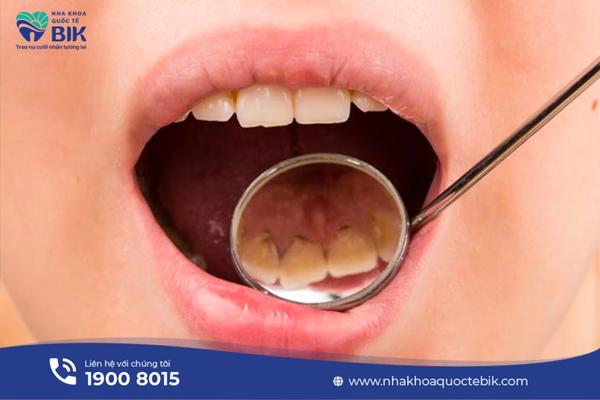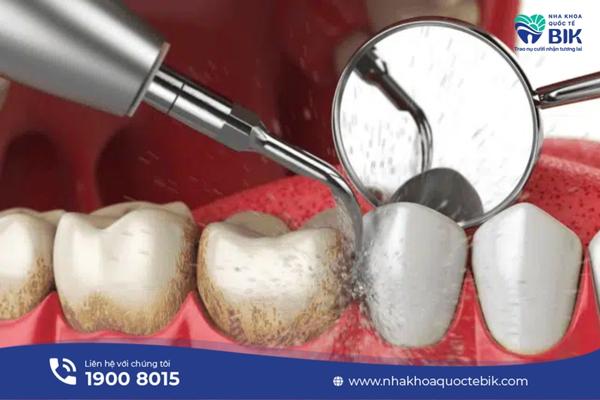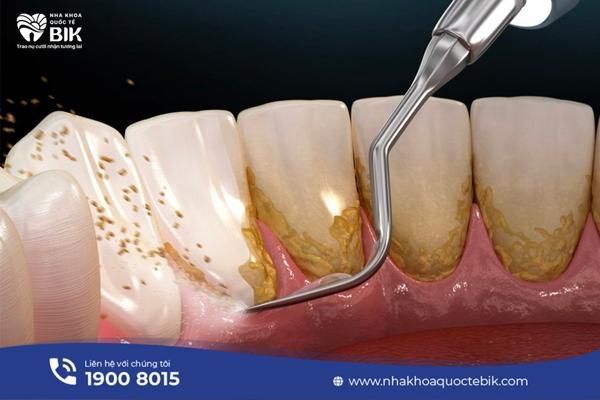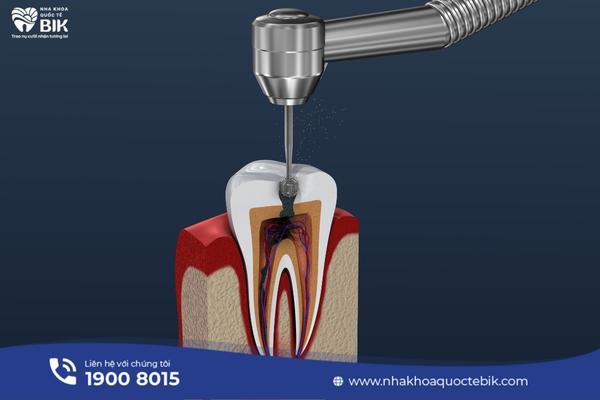Scaling is a fairly simple technique in dentistry that almost any dentist can perform. Scaling will remove tartar that has accumulated over time on the tooth surface and this technique will not cause any damage to the teeth if performed by a highly skilled and qualified dentist.
1. What is scaling?
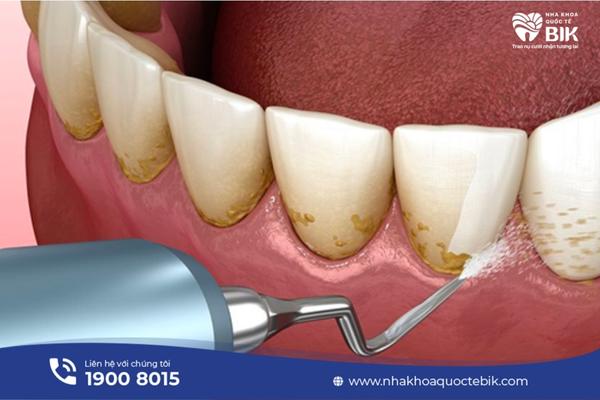
In fact, after eating for about 15 minutes, if the teeth are not cleaned, a thin layer will be left on the tooth surface. Over time, this layer will accumulate over time and form tartar that adheres firmly to the tooth surface or under the gum line.
So dental tartar is essentially plaque or food debris left in the oral cavity. Under the influence of bacteria, this plaque will be calcified and is often opaque white or light yellow. The longer tartar accumulates, the thicker it will be and the darker its color will be. At the same time, this is the environment for bacteria to grow, causing many oral problems such as periodontitis, pulpitis, bad breath, bleeding gums, etc.
Because tartar adheres very firmly to the tooth surface, professional scaling at the dentist is the only way to clean it. Scaling is the process in which the dentist uses a specialized tool to create vibrations so that plaque falls off the gums and tooth body. This is a relatively basic and simple technique in dentistry but still requires precision and meticulousness from the dentist.
2. Types of dental calculus
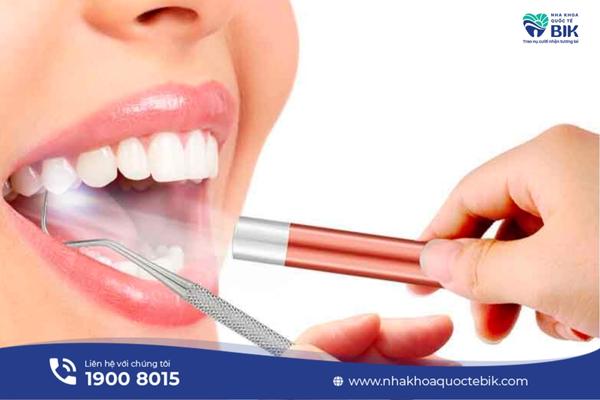
Usually, dental calculus is divided into 2 types:
2.1. Saliva tartar
This type of tartar is light yellow, yellow-brown or reddish-brown in color, so it can be easily seen with the naked eye. Saliva tartar is formed when calcium salts in saliva precipitate into food plaque on the tooth surface and adhere to the gums or tooth surface.
2.2. Serum tartar
This type of tartar is caused by bleeding gums, at which time the serum in the blood will adhere to saliva tartar. This is a favorable condition for bacteria to accumulate and develop, causing the tartar layer to become thicker and thicker, causing many other oral diseases. Serum tartar is often difficult to see with the naked eye because it is formed under the gums even though it is black.
3. Why should we have our teeth scaled?
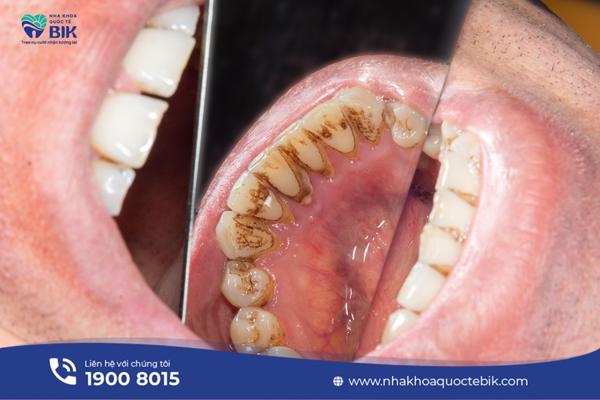
Dental tartar is a very thick, hard plaque that sticks tightly to the tooth surface. The color of tartar is different from the natural color of teeth, so it is easily seen with the naked eye, causing an unsightly smile in daily communication. Not only that, bacteria in tartar can easily attack and harm oral health:
– Bacteria produce unpleasant odors that cause bad breath, making it difficult to communicate
– Bacteria ferment carbohydrates to create acid that damages tooth enamel and causes tooth decay
– Damaged tooth enamel will cause tooth sensitivity, making it difficult to clean teeth
– Bacteria in tartar will cause diseases such as gingivitis, bleeding gums, … and if not treated promptly can lead to periodontitis, receding gums, loose teeth and even mass tooth loss
– Is the cause of diseases such as tonsillitis, pharyngitis, stomatitis,…
So scaling is absolutely necessary for everyone to prevent dental problems as well as improve the aesthetics of the smile.
4. Does scaling hurt?

With modern technology, all dental facilities have been equipped with ultrasonic scaling machines instead of traditional hook-head scaling machines. With this technology, tartar will be completely removed by ultrasonic vibration without damaging the tooth enamel. Therefore, scaling is considered a fairly simple technique and is completely painless for customers. However, many customers may still feel a little pain and the amount of pain depends on the following factors:
4.1. Oral health
In cases where customers have diseases such as periodontitis, gingivitis, swollen gums, scaling will cause more pain or bleeding because the tool still has to come into direct contact with the damaged gums to remove tartar.
4.2. Tartar condition
The condition of the tartar plaque will be an important factor in determining whether scaling is painful or not. In case the tartar has accumulated into a thick layer and adhered tightly under the gums, the tartar removal will be a little painful. However, this feeling will disappear after a few days and will not affect the chewing function of the teeth at all.
4.3. Doctor’s skills
Scaling teeth with modern technology does not affect soft tissue or enamel at all, however, damage can still occur if the doctor’s skills are not high, the operation is not precise, causing the inner cheek or tongue to be affected. Therefore, it is necessary to choose reputable dental addresses to ensure that the tartar removal process does not affect the teeth and mouth.
5. Does scaling whiten teeth?
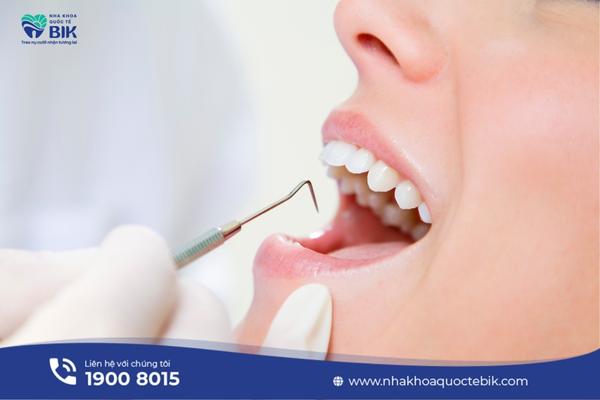
Scaling is a technique to remove unsightly plaque on the tooth surface, between teeth and at the root, so it not only helps to clean teeth but also helps to prevent other oral diseases.
Although after scaling, the dentist will polish the tooth surface to make the teeth cleaner and smoother, scaling does not seem to whiten teeth. When other colored plaques are removed, the teeth can only lighten to a certain extent and cannot become white. Therefore, if you want to have bright white teeth, you should choose professional teeth whitening methods at the dentist for the best results.
6. Is it good to have your teeth scaled often?
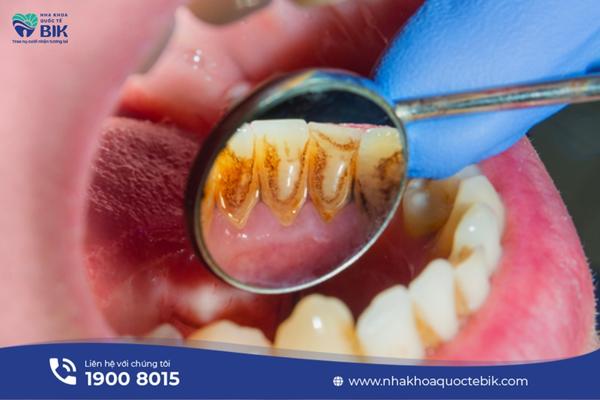
Because long-term accumulation of tartar will cause many dangers to oral health, scaling is extremely necessary and brings many benefits. However, regular scaling will cause bleeding gums and many other injuries. Therefore, customers should only perform scaling periodically, depending on each oral case, the interval between scaling is different.
Usually, doctors recommend scaling about every 6 months for cases of good oral health and smooth enamel. This is the most suitable time because at this time, tartar has not formed too much, making it difficult to remove tartar and tartar has not yet been able to affect the gums.
In cases where teeth have rough enamel, easily accumulate excess food particles, people who often drink tea, coffee or smoke should have their tartar removed every 3-4 months.
7. Notes after scaling teeth

– Avoid using foods that are too hot or too cold to prevent tooth sensitivity because the teeth are now in a sensitive state
– Stay away from cigarettes and dark-colored foods such as tea, coffee, carbonated drinks,…
– Proper oral hygiene, avoid damaging sensitive teeth
– Supplement with vitamins and fiber from natural foods
– You can pay attention to calcium supplementation to support healthy teeth
– Have regular check-ups and have your teeth cleaned to keep them clean and beautiful
8. How to prevent tartar formation?

Since tartar is often harmful to oral health, it is best to prevent tartar formation with the following habits:
8.1. Oral hygiene
Brush your teeth twice a day, combined with dental floss and mouthwash to thoroughly remove plaque and food debris stuck in between teeth. Remember to rinse your mouth with saline immediately after eating to avoid leaving plaque on the tooth surface. In addition, you can use toothpaste containing Fluoride to help strengthen teeth.
8.2. Pay attention to your diet
– Limit smoking or dark-colored foods such as coffee,… which cause teeth to easily discolor due to plaque that accumulates over time
– Limit foods that are too soft and chewy such as chocolate, marshmallows,… because they are difficult to clean thoroughly
– Limit foods that contain a lot of starch, sugar,…
– Follow a healthy diet, supplement with lots of fiber and vitamins to increase resistance
So scaling teeth is a fairly simple, popular technique and brings many benefits. Although simple, if you want to achieve high efficiency, customers should choose reputable dental facilities with a team of doctors with many years of experience in the profession to avoid any pain or discomfort during the service.


